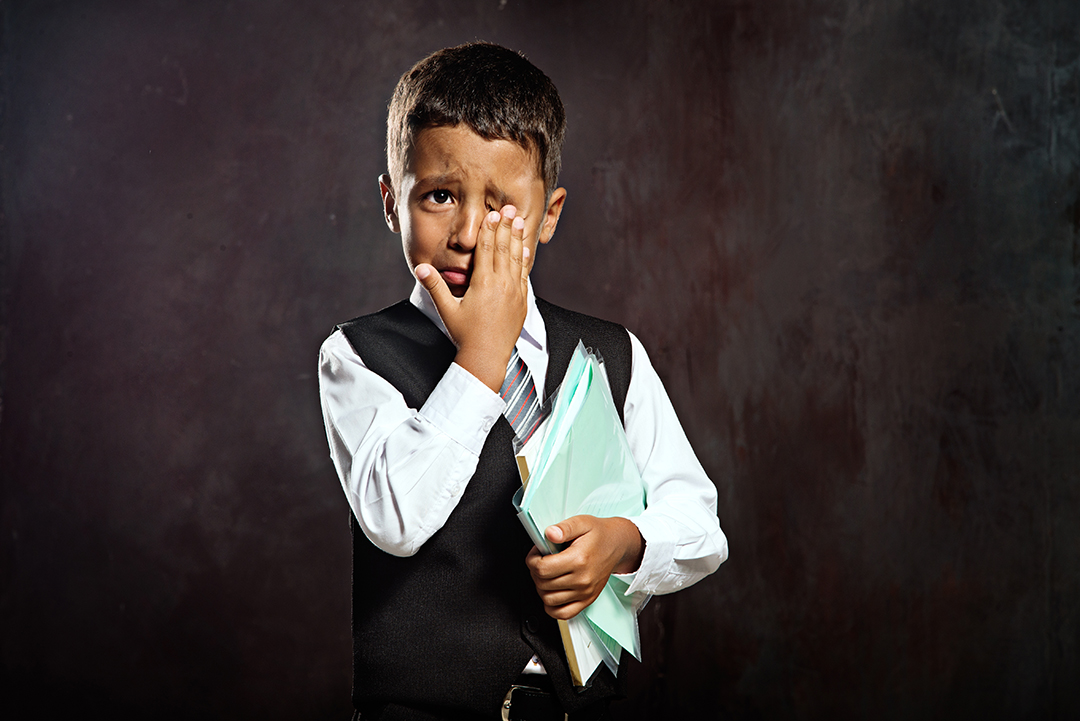School anxiety EBSA are growing concerns that significantly impact students’ mental health and overall well-being. This blog explores the mental health consequences of these issues.
Understanding EBSA
EBSA refers to severe difficulty attending school due to emotional factors. It’s estimated to affect 1-5% of school-age children and is more prevalent in secondary schools1. EBSA is not simply truancy or school refusal, it reflects genuine emotional distress that hinders school attendance manifesting in various ways, including:
- Complete absence from school
- Periodic absences or missing specific classes
- Difficulty attending school after weekends or holidays
- Frequent late arrivals or early departures
- Extreme distress when attending school.
It’s crucial to note that EBSA is not simply a matter of “refusing” school, as the term “school refusal” might imply. Instead, it reflects genuine emotional distress that makes school attendance challenging for the child.
The causes of school anxiety and EBSA are often complex and multifaceted. Some common factors include;
- Separation anxiety
- Social anxiety or difficulties with peer relationships
- Academic pressures or learning difficulties
- Bullying or negative school experiences
- Transitions (e.g., moving to a new school)
- Family factors (e.g., parental illness, family conflict)
- Mental health issues (e.g., depression, anxiety disorders).

Mental Health Impacts
The cumulative effect of missed school days and learning opportunities can have long-lasting impacts on educational attainment and future career prospects. This can contribute to ongoing mental health challenges related to self-esteem and life satisfaction. Mental health issues can include;
Anxiety and Depression – One of the most significant mental health impacts of EBSA is the development or exacerbation of anxiety disorders and depression. Research has shown that children with school avoidance behaviours are at higher risk for anxiety disorders, with separation anxiety and social anxiety being particularly common2. A longitudinal study found that adolescents with school refusal behaviour were more likely to experience anxiety and depression in adulthood3.
Social Isolation and Loneliness – EBSA often leads to social isolation as students miss out on crucial peer interactions and social learning opportunities. This isolation can contribute to feelings of loneliness and social anxiety, potentially impacting social skill development4. The lack of social connection can further exacerbate existing mental health issues.
Low Self-Esteem and Self-Efficacy – Persistent school avoidance can negatively impact a student’s self-esteem and sense of self-efficacy. As they fall behind academically and socially, they may develop negative self-perceptions and a reduced belief in their ability to cope with school-related challenges5.
Family Stress and Relationship Strain – EBSA doesn’t just affect the individual student; it can also create significant stress within the family unit. Parents may experience increased anxiety, frustration, and conflict with their child, potentially straining family relationships.
Sleep Disturbances – Anxiety related to school attendance can lead to sleep disturbances, including difficulty falling asleep, nightmares, and irregular sleep patterns. Poor sleep quality can, in turn, exacerbate anxiety and depression symptoms.
Somatic Symptoms – Many children with EBSA experience physical symptoms of anxiety, such as headaches, stomach aches, and nausea. These somatic complaints can become chronic and interfere with daily functioning.
Addressing the Mental Health Impact
Recognising the significant mental health implications of school anxiety and EBSA, it’s important to implement evidence-based interventions.
Cognitive Behavioural Therapy (CBT) – CBT has shown effectiveness in treating anxiety disorders in children and adolescents, including those related to school avoidance.
School-Based Interventions – Implementing supportive strategies within the school environment, such as gradual exposure techniques, safe spaces, and flexible learning arrangements, can help reduce anxiety and improve attendance.
Family-Based Interventions – Involving parents and addressing family dynamics can be crucial in managing EBSA. Parent training and family therapy have shown positive outcomes in improving school attendance.
Medication – In some cases, particularly when anxiety or depression is severe, medication may be considered as part of a comprehensive treatment plan.
Multi-Disciplinary Approach – A collaborative approach involving mental health professionals, educators, and families is often most effective in addressing the complex needs of students with EBSA.

Conclusion
School anxiety and EBSA are complex issues that require understanding, patience, and a coordinated response. The mental health impact of school anxiety and emotional based school avoidance is significant and multifaceted. It affects not only the individual student but also their family and potentially their long-term life outcomes.
By implementing evidence-based strategies and fostering a supportive school environment, we can help struggling students overcome their anxieties and re-engage with education. It’s important to remember that recovery is often a gradual process. Celebrating small successes and maintaining a positive, optimistic approach can make a significant difference in a child’s journey back to regular school attendance.
By addressing EBSA effectively, we not only improve educational outcomes but also support the overall well-being and future prospects of our children and young people. As educators, parents, and mental health professionals work together, we can create more inclusive and supportive learning environments that help all students thrive, regardless of their emotional challenges.
Where next?
ACAMH are running a webinar on 3 October School Anxiety & Emotional Based School Avoidance that will bring attention to, and focus on, the emotional components of being a pupil or student in the journey of schooling and learning. The session will take strong and particular interest in the rise in problems of attendance during and since the COVID closures, along with rising suspension & exclusion rates in the years leading up to the pandemic, and at present. Speakers and participants will explore approaches for which there is evidence that “school based anxiety” driving attendance and inclusion problems can be addressed positively, in the interest of individual achievement outcomes and children’s investment in learning.
Delegates will have exclusive access to recordings for 90 days after the event, together with slides. Plus you will get a personalised CPD certificate via email. Don’t forget as a charity any surplus made is reinvested back as we work to our vision of ‘Sharing best evidence, improving practice’, and our mission to ‘Improve the mental health and wellbeing of young people aged 0-25’.

References
- Heyne, D., Gren-Landell, M., Melvin, G., & Gentle-Genitty, C. (2019). Differentiation between school attendance problems: Why and how? Cognitive and Behavioral Practice, 26(1), 8-34.
- Kearney, C. A., & Albano, A. M. (2004). The functional profiles of school refusal behavior. Behavior Modification, 28(1), 147-161.
Flakierska-Praquin, N., Lindström, M., & Gillberg, C. (1997). School phobia with separation anxiety disorder: A comparative 20- to 29-year follow-up study of 35 school refusers. Comprehensive Psychiatry, 38(1), 17-22. - Rubin, K. H., Coplan, R. J., & Bowker, J. C. (2009). Social withdrawal in childhood. Annual Review of Psychology, 60, 141-171.
- Maric, M., Heyne, D. A., de Heus, P., van Widenfelt, B. M., & Westenberg, P. M. (2012). The role of cognition in school refusal: An investigation of automatic thoughts and cognitive errors. Behavioural and Cognitive Psychotherapy, 40(3), 255-269.
- Ingul, J. M., Klöckner, C. A., Silverman, W. K., & Nordahl, H. M. (2012). Adolescent school absenteeism: Modelling social and individual risk factors. Child and Adolescent Mental Health, 17(2), 93-100.
This blog has been peer reviewed
Further reading
McCune, N., & Hynes, J. (2005). Ten year follow-up of children with school refusal. Irish Journal of Psychological Medicine, 22(2), 56-58.
Kearney, C. A., & Silverman, W. K. (1995). Family environment of youngsters with school refusal behavior: A synopsis with implications for assessment and treatment. The American Journal of Family Therapy, 23(1), 59-72.
Henry, K. L., & Thornberry, T. P. (2010). Truancy and escalation of substance use during adolescence. Journal of Studies on Alcohol and Drugs, 71(1), 115-124.
Chase, R. M., & Pincus, D. B. (2011). Sleep-related problems in children and adolescents with anxiety disorders. Behavioral Sleep Medicine, 9(4), 224-236.
Crawley, S. A., Caporino, N. E., Birmaher, B., Ginsburg, G., Piacentini, J., Albano, A. M., … & Kendall, P. C. (2014). Somatic complaints in anxious youth. Child Psychiatry & Human Development, 45(4), 398-407.
Fremont, W. P. (2003). School refusal in children and adolescents. American Family Physician, 68(8), 1555-1560.
Pina, A. A., Zerr, A. A., Gonzales, N. A., & Ortiz, C. D. (2009). Psychosocial interventions for school refusal behavior in children and adolescents. Child Development Perspectives, 3(1), 11-20.
Kearney, C. A., & Graczyk, P. (2014). A response to intervention model to promote school attendance and decrease school absenteeism. Child & Youth Care Forum, 43(1), 1-25.
Heyne, D., Sauter, F. M., Van Widenfelt, B. M., Vermeiren, R., & Westenberg, P. M. (2011). School refusal and anxiety in adolescence: Non-randomized trial of a developmentally sensitive cognitive behavioral therapy. Journal of Anxiety Disorders, 25(7), 870-878.
Melvin, G. A., & Gordon, M. S. (2019). Antidepressant medication: Is it a viable and valuable adjunct to cognitive-behavioral therapy for school refusal? Cognitive and Behavioral Practice, 26(1), 107-118.
Ingul, J. M., Havik, T., & Heyne, D. (2019). Emerging school refusal: A school-based framework for identifying early signs and risk factors. Cognitive and Behavioral Practice, 26(1), 46-62.